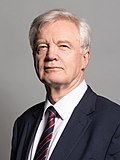| Secretary of State for Exiting the European Union | |
|---|---|
 | |
| Department for Exiting the European Union | |
| Style | Brexit Secretary (informal) The Right Honourable (within the UK and the Commonwealth) |
| Member of | Cabinet |
| Reports to | Prime Minister of the United Kingdom |
| Seat | Westminster, London |
| Appointer | The Monarch on advice of the Prime Minister |
| Term length | At Her Majesty's pleasure |
| Formation | 13 July 2016 |
| First holder | David Davis |
| Final holder | Steve Barclay |
| Abolished | 31 January 2020 |
| Part of a series of articles on |
| UK membership of the European Union (1973–2020) |
|---|
 |
| This article is part of a series on |
| Politics of the United Kingdom |
|---|
 |
The Secretary of State for Exiting the European Union or, informally, Brexit Secretary, [1] was a secretary of state in the Government of the United Kingdom, responsible for the business of the Department for Exiting the European Union, as well as for the UK's withdrawal from the European Union (EU), informally referred to as "Brexit". The secretary of state oversaw Brexit negotiations following a 2016 referendum, in which a majority of those who voted were in favour of exiting the EU. [2] [3] The officeholder was a member of the Cabinet.
The position was created on 13 July 2016, at the outset of the premiership of Theresa May. [4] The office was abolished on 31 January 2020, during the premiership of Boris Johnson, as the United Kingdom left the European Union. [5] A new cabinet position of Minister of State for Brexit Opportunities and Government Efficiency was later created. [6]
The Minister of State for Exiting the European Union deputised for the secretary of state. The corresponding shadow minister was the Shadow Secretary of State for Exiting the European Union. The secretary of state was also scrutinised by the Exiting the European Union Select Committee. [7]
This page also includes the portfolios of the Chief Negotiator for Exiting the European Union and Parliamentary Under-Secretary of State for Exiting the European Union.






















